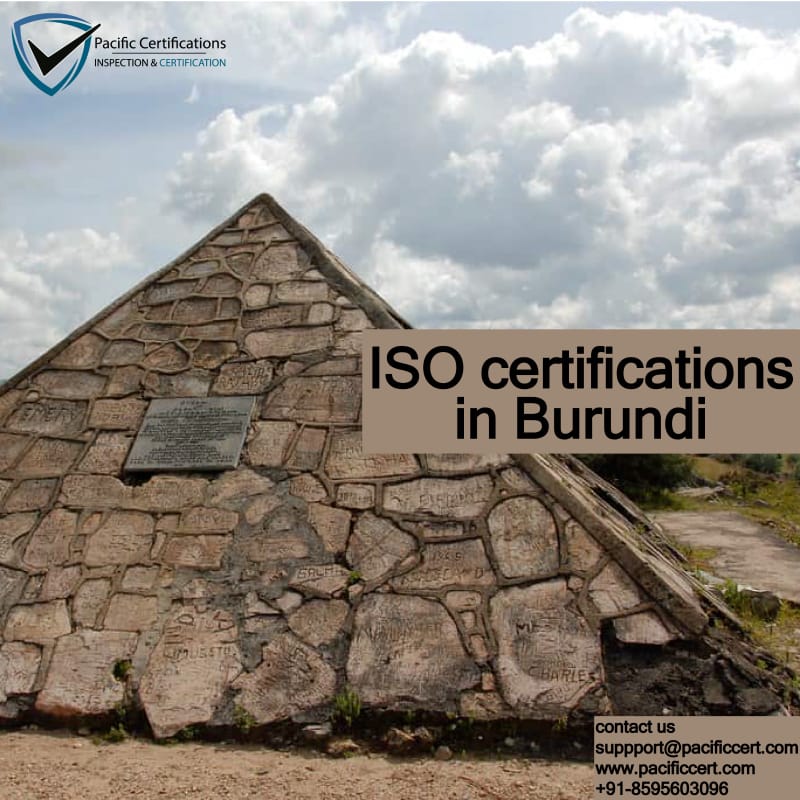ISO Certifications in Burundi, Popular Standards, Requirements and Benefits

Introduction
ISO certifications are a crucial aspect of business operations worldwide, ensuring that organizations meet international standards for quality, environmental management, health and safety, information security, and more. These certifications are particularly valuable in countries like Burundi, where businesses may seek to establish credibility, access global markets, and enhance operational efficiency.
Let's explore the ISO certifications relevant to Burundi, the applicable standards, and how Pacific Certifications can assist with audit and certification processes.
ISO Certifications in Burundi
In Burundi, as in other countries, businesses and organizations can benefit from a range of ISO certifications, depending on their operational focus and objectives. The most commonly sought-after ISO certifications include:
ISO 9001: Quality Management Systems (QMS):
This is the most widely recognized ISO standard, focusing on meeting customer expectations and delivering customer satisfaction. It is applicable to organizations in all sectors.
ISO 14001: Environmental Management Systems (EMS):
This standard helps organizations improve their environmental performance through more efficient use of resources and reduction of waste, gaining a competitive advantage and the trust of stakeholders.
ISO 45001: Occupational Health and Safety Management Systems:
This standard provides a framework to increase safety, reduce workplace risks, and enhance health and well-being at work, crucial for all organizations looking to improve their occupational health and safety performance.
ISO 27001: Information Security Management Systems (ISMS):
Particularly relevant in the digital age, ISO 27001 helps organizations manage the security of assets such as financial information, intellectual property, employee details, or information entrusted by third parties.
Click here to find out more applicable standards to your industry
How Pacific Certifications Can Assist?
We can significantly streamline the process of obtaining ISO certifications in Burundi through the following services:
Pre-Audit Assessment:
Conducting a pre-audit assessment to identify any areas of non-compliance and advising on the necessary corrective actions before the certification audit.
Certification Audit:
Performing the formal audit required to assess whether the organization's management systems meet the requirements of the ISO standard. If the audit is successful, Pacific Certifications will issue the ISO certification.
Training:
Offering training to the organization's staff on the requirements of the ISO standards and how to implement and maintain an effective management system that complies with those standards.
Pacific Certifications accredited by ABIS to issue management system certifications and product certifications, ensures that organizations in Burundi can achieve and maintain their ISO certifications with confidence.
The support from us at Pacific Certifications in navigating the audit and certification process can help organizations in Burundi not only to improve their internal processes but also to signal their commitment to international standards, thereby gaining a competitive edge in both local and global markets.
Requirements of ISO Certifications in Burundi
The requirements for ISO certifications in Burundi, as in other countries, revolve around the specific standards organizations aim to comply with. While each ISO standard has its unique set of requirements, they all share the common goal of improving quality, efficiency, reliability, and safety within organizations. Here, we'll outline some general steps and specific requirements related to the most commonly sought ISO certifications.
- Understand the Standard: Organizations must first understand the specific requirements of the ISO standard they are pursuing. This involves a thorough review of the standard's clauses and how they apply to the organization's processes and operations.
- Gap Analysis: Conducting a gap analysis to determine the difference between current practices and the requirements of the ISO standard. This helps identify areas that need improvement.
- Develop an Implementation Plan: Based on the gap analysis, develop a plan to align the organization's practices with the ISO requirements. This may involve revising existing processes, implementing new procedures, and training employees.
- Implement Changes: Apply the changes according to the plan, which may include modifying existing processes, introducing new ones, and ensuring that all employees are aware of their responsibilities under the new system.
- Internal Audit: Conduct an internal audit to check compliance with the ISO standard. The audit should identify any non-conformities or areas for improvement.
- Management Review: Senior management should review the findings of the internal audit and the overall effectiveness of the management system to ensure continuous improvement.
- Certification Audit: An external audit by a certification body, such as Pacific Certifications, will verify the organization's compliance with the ISO standard. This audit typically occurs in two stages: an initial review (Stage 1) to ensure readiness and a more detailed examination (Stage 2) of the management system's implementation.
Specific Requirements of Common ISO Certifications
ISO 9001 (Quality Management Systems) Requirements:
Requirements include a strong customer focus, leadership involvement, engagement of people, process approach to quality management, continual improvement, evidence-based decision-making, and relationship management.
ISO 14001 (Environmental Management Systems) Requirements:
Key requirements involve understanding the organization's environmental aspects and impacts, compliance with environmental regulations, setting environmental objectives and targets, and continuous improvement of environmental performance.
ISO 45001 (Occupational Health and Safety Management Systems) Requirements:
Organizations must demonstrate an understanding of their occupational health and safety risks, legal and other requirements, objectives and planning to address risks and opportunities, and continuous improvement of the occupational health and safety performance.
ISO 27001 (Information Security Management Systems) Requirements:
This standard requires organizations to assess information security risks, including vulnerabilities, threats, and impacts, and implement appropriate controls to manage or reduce them. It also requires continuous monitoring, review, and improvement of the information security management system.
We can guide organizations through every step of this process, offering services such as training, pre-audit assessments, and the certification audit itself. With our expertise, Pacific Certifications helps to ensure that organizations not only meet the requirements for ISO certification but do so in a way that maximizes the benefits to the organization.
This includes improving processes, reducing risks, enhancing customer satisfaction, and ensuring a culture of continuous improvement.
Benefits of ISO Certifications in Burundi
ISO certifications bring a multitude of benefits to organizations in Burundi, across various industries. These certifications are not just about meeting international standards; they are about enhancing operational efficiencies, accessing new markets, and improving overall performance. Below are the key benefits of obtaining ISO certifications for businesses in Burundi:
Enhanced Quality and Efficiency
ISO 9001 is synonymous with quality management. Achieving this certification demonstrates an organization's commitment to quality products and services, increasing customer satisfaction and loyalty. It streamlines processes, reduces errors, and ensures a framework for continuous improvement, leading to enhanced operational efficiency and productivity.
Environmental Responsibility
ISO 14001 focuses on environmental management systems. For organizations in Burundi, this certification underscores their commitment to environmental stewardship, helping reduce waste, improve resource efficiency, and minimize their environmental footprint. This not only benefits the planet but also aligns with the growing global demand for sustainable and environmentally friendly business practices.
Occupational Health and Safety
ISO 45001 is crucial for organizations looking to improve their occupational health and safety (OHS) standards. This certification helps reduce workplace accidents and illnesses, creating a safer environment for employees. It demonstrates an organization's dedication to safeguarding its workforce, which can enhance employee morale and reduce costs associated with accidents and occupational health issues.
Information Security
ISO 27001 is essential for protecting sensitive information. This certification helps organizations in Burundi to manage and protect their information assets, ensuring confidentiality, integrity, and availability of data. It can help prevent data breaches and cyber-attacks, building trust with customers, stakeholders, and partners.
Competitive Advantage
ISO certifications can provide a competitive edge in the domestic and international markets. They are often a prerequisite for tendering for contracts, especially with governmental and multinational companies, opening up new business opportunities.
Regulatory Compliance
Adhering to ISO standards can help organizations comply with legal and regulatory requirements, reducing the risk of non-compliance penalties and legal issues.
Market Perception and Credibility
ISO certification enhances an organization's credibility and reputation, signaling to customers, partners, and stakeholders that it adheres to globally recognized standards. This can be particularly important for businesses in Burundi looking to establish trust and expand their markets.
Access to Global Markets
Compliance with international standards facilitates trade across borders. For businesses in Burundi, ISO certification can be a gateway to global markets, as it reassures international partners of the organization's commitment to quality and best practices.
Continuous Improvement
The ISO framework encourages continuous improvement, ensuring that organizations regularly evaluate their processes, identify areas for improvement, and implement corrective actions. This leads to enhanced performance and adaptability over time.
Which industries need ISO Certifications in Burundi?
ISO certifications are applicable across a wide range of industries due to their focus on quality management, environmental management, information security, and occupational health and safety, among others.
In Burundi, as in other countries, these certifications can play a crucial role in enhancing operational efficiencies, meeting regulatory requirements, accessing new markets, and building customer trust. Here’s a look at various industries in Burundi that can significantly benefit from ISO certifications:
Manufacturing
- ISO 9001 (Quality Management Systems): Ensures that products meet customer and regulatory requirements, enhancing efficiency and customer satisfaction.
- ISO 14001 (Environmental Management Systems): Helps in managing environmental aspects, reducing waste, and ensuring regulatory compliance.
Agriculture and Agro-processing
- ISO 22000 (Food Safety Management Systems): Critical for ensuring the safety of food products, from farm to fork, enhancing trust among consumers and stakeholders.
- ISO 14001: Assists in sustainable agricultural practices and reducing environmental impact.
Healthcare
- ISO 13485 (Medical Devices): Ensures the quality and safety of medical devices, which is crucial for patient care and regulatory compliance.
- ISO 45001 (Occupational Health and Safety Management Systems): Important for ensuring the safety and well-being of healthcare workers and patients.
Information Technology and Telecommunications
- ISO/IEC 27001 (Information Security Management Systems): Essential for protecting sensitive data and ensuring business continuity in the face of cyber threats.
- ISO 9001: Helps in managing and improving IT processes and services to meet customer and regulatory requirements.
Construction and Engineering
- ISO 45001: Ensures a safe working environment, reducing the risk of accidents and enhancing worker satisfaction.
- ISO 9001: Important for ensuring that construction projects meet quality standards and specifications.
Education
- ISO 21001 (Educational Organizations Management Systems): Designed to enhance the satisfaction and learning outcomes of students, ensuring educational services meet students' and other beneficiaries' requirements.
Tourism and Hospitality
- ISO 22000: Ensures food safety in restaurants and hotels, which is vital for customer trust and satisfaction.
- ISO 9001: Helps in improving service quality and customer experience in the tourism sector.
Financial Services
- ISO/IEC 27001: Especially relevant for protecting financial data and ensuring the integrity of financial transactions.
- ISO 9001: Enhances efficiency and reliability of financial services, improving customer trust and satisfaction.
Public Sector
- ISO 37301 (Compliance Management Systems): Helps public organizations demonstrate they operate with integrity and compliance with laws and regulations.
- ISO 14001: Assists in sustainable environmental management within public services and facilities.
Non-Profit Organizations
- ISO 9001: Helps in enhancing the efficiency and effectiveness of non-profit organizations, ensuring they deliver on their mission and improve beneficiary satisfaction.
Conclusion
For businesses and organizations in these and other sectors in Burundi, achieving ISO certification with the assistance of a certification body can offer a structured framework for operational excellence, market expansion, and sustainable development.
We at Pacific Certifications can provide the necessary guidance, support, and expertise to navigate the certification process, ensuring organizations meet the international standards required to compete effectively in the global marketplace.
Pacific Certifications is accredited by ABIS, in case you need support with ISO certification for your business in Burundi, please contact us at [email protected] or +91-8595603096.
Ready to get ISO certified?
Contact Pacific Certifications to begin your certification journey today!
Suggested Certifications –
Read more: Pacific Blogs

